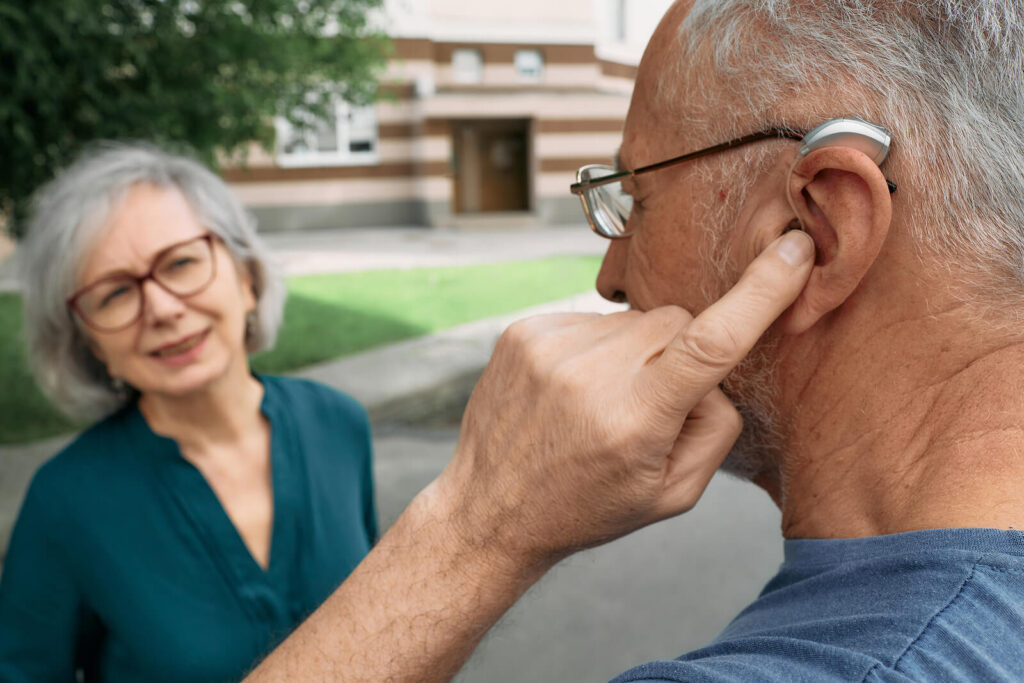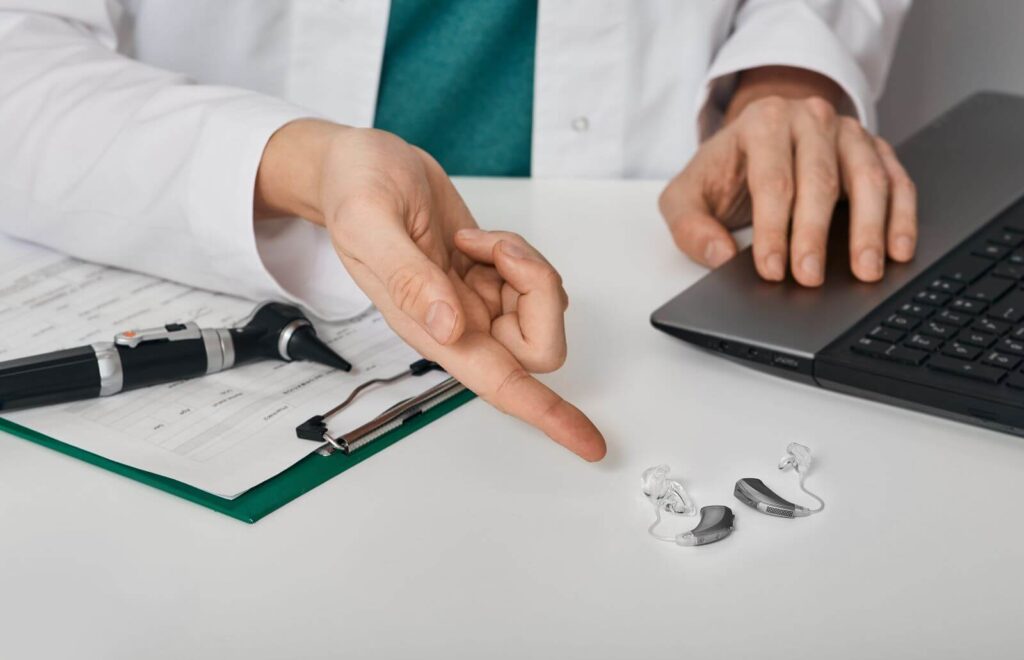Key Highlights
- Age-related hearing loss is a common problem among the elderly population.
- aids can greatly improve quality of life for individuals with age-related hearing loss.
- Social isolation is a common consequence of hearing loss, highlighting the importance of early detection and treatment.
- Regular hearing tests are essential in monitoring and managing age-related hearing loss.
- Health care providers play a crucial role in identifying and addressing age-related hearing loss.
- Preventative measures such as regular check-ups and lifestyle adjustments can help reduce the risk of age-related hearing loss.
Introduction
Age-related hearing loss (ARHL) also called presbycusis, is something many older people face. It’s a gradual decline in hearing that can seriously affect how well you live. Presbycusis is usually characterized by difficulty hearing high-pitched sounds and understanding speech, especially in noisy environments. It can affect both ears equally and can range from mild to severe.
Our bodies change in all sorts of ways as we get older, and our ears are sadly no different. The inner ear’s complex system, including those tiny hair cells that pick up sound, just doesn’t work as well over the years. This makes hearing and understanding people harder.
A big worry with age-related hearing loss is how it messes with communication and socialising. People might struggle to keep up in conversations, which can be frustrating and make them feel alone. It’s easy to miss important stuff and have to rely on others more. Plus, hearing loss can mess with your head, causing more stress and making it more likely you’ll have mental health problems.
Luckily, technology’s gotten better, and now there are a wide range of hearing aids to help seniors. Finding hearing loss early and doing something about it is important. This can stop it from getting worse and lessen how much it affects your everyday life.
Why Does Hearing Get Worse With Age?
Our inner ears have these super-tiny hair cells, and their job is changing sound waves into signals our brains can work with. Sadly, as we get older, those cells can get damaged or stop working altogether. This makes hearing and understanding what people say a lot tougher.
Here’s a key point: age-related hearing loss doesn’t mean someone can’t hear anything at all. They might still pick up on some sounds, but understanding what people are saying gets a lot harder.
It’s easy to think this sort of hearing loss is simply what happens as you get older, but that’s not helpful. It’s important to see an audiologist and figure out what options are out there.
Getting your hearing checked regularly after 50 helps catch changes early, which means you can start managing it sooner.
The Prevalence of Hearing Loss in the Elderly
Lots of older folks deal with some hearing loss. Studies say about a third of adults over 65 have it to some degree. And as people get even older, that number jumps – just over half of those 75 and up have trouble hearing well.
It’s important to remember that getting older isn’t the only reason hearing can change. Things like your genes, being around loud noises a lot, even some health problems like diabetes can play a role.
Early Indicators of Hearing Loss
Having a tough time following what people say in places like restaurants can be a sign of age-related hearing loss. The same goes for struggling on phone calls or needing people to repeat themselves a lot. If your family notices the TV getting louder and louder, or you’ve got a ringing sound in your ears (that’s called tinnitus), it’s definitely time to see a hearing specialist.
The sooner the better!
Understanding the Causes Behind Age-Related Hearing Loss
Age-related hearing loss can stem from various factors.
Genetic Factors and Hearing Decline
Research indicates a strong hereditary component in the development of presbycusis, impacting the health of the inner ear and its delicate hair cells.
Understanding these genetic causes can help in early detection giving individuals the opportunity to proactively address potential risks through regular monitoring and suitable treatment options.
Environmental and Lifestyle Influences
Exposure to loud noise, especially over time, is a significant environmental factor contributing to age-related hearing loss. Prolonged or repeated exposure to loud sounds can damage the delicate hair cells in the inner ear.
Furthermore, lifestyle decisions like smoking and poor cardiovascular health can have an effect on hearing health. Recognising and reducing these factors can aid in maintaining hearing capabilities as people grow older.
The Impact of Hearing Loss on Daily Life
Hearing loss not only affects personal relationships but also limits participation in social activities. Seeking support from a hearing specialist and utilizing assistive devices can greatly improve daily interactions and overall well-being for older adults experiencing age-related deafness.
Communication Challenges and Social Isolation
Dealing with hearing loss as you age can make things really tough. Struggling to follow conversations in noisy environments or missing out on important information due to hearing impairment can lead to feelings of loneliness and isolation.
It’s easy to withdraw when you’re struggling, but that makes it worse.
Luckily there are ways to manage this. Finding a hearing specialist, exploring hearing aid technology and letting those close to you know what you’re going through, are a few ways that can help. It won’t make the hearing loss go away, but it can make a world of difference.
Psychological Effects and Mental Health
Untreated age-related deafness can lead to psychological issues and impact mental health.
Individuals may experience feelings of isolation, frustration, and even depression due to difficulty hearing in social settings, therefore resulting in a decline in overall well-being.
Technological Aids and Solutions
Technological advancements offer a lifeline for age-related deafness. Hearing aids and assistive devices, like ALDs, can significantly improve communication. These tools amplify sounds and help mitigate background noise, crucial for older adults experiencing difficulty hearing in various environments.
Embracing such solutions not only enhances the quality of life but also combats social isolation. By consulting a hearing specialist or audiologist, tailored solutions such as hearing aids or cochlear implants can offer personalised support for managing hearing loss.
The Role of Hearing Aids
Hearing aids play a crucial role in managing age-related hearing loss. These devices enhance the perception of sounds, aiding in communication and daily activities. By targeting specific frequencies, hearing aids improve the overall listening experience, especially in noisy environments. Older adults benefit significantly from the advanced technology embedded in modern hearing aids, helping them maintain social connections and engagement.
Assistive Listening Devices (ALDs)
Assistive listening devices (ALDs) are designed to enhance communication abilities in specific situations and environments. They work alongside or in conjunction with hearing aids to improve speech understanding and reduce the impact of background noise.
ALDs include devices like personal FM systems, loop systems, and amplified telephones. Personal FM systems consist of a transmitter and a receiver, allowing the speaker’s voice to be directly transmitted to the listener’s hearing aid or receiver.
Loop systems use electromagnetic energy to transmit sound directly to a hearing aid or cochlear implant, reducing the impact of background noise.
Amplified telephones amplify sound and provide clearer communication during phone conversations.
These assistive devices can greatly enhance communication abilities and improve the overall quality of life for individuals with hearing loss.
Preventative Measures and Lifestyle Adjustments
Taking preventative measures can help protect against age-related hearing loss and maintain good hearing health.
Protecting Your Hearing Through Lifestyle Choices
Protecting your hearing takes some conscious choices, but those choices can prevent hearing loss later on. One big thing is limiting how often you’re around really loud noises – concerts, some workplaces, etc. Earplugs or earmuffs are essential in those situations. The same goes for music on headphones or earbuds – keep the volume down and give your ears breaks from time to time.
Regular Check-Ups and Early Detection
Want to keep your hearing in good shape? Regular check-ups are key, especially as you get older. It’s a good idea to get your hearing tested by a professional from time to time. These tests pick up on even small changes in how well you hear, helping you catch any hearing loss early.
The sooner you know about hearing loss, the sooner you can get the right kind of help.
Closing Thoughts
Age-related hearing loss is a common concern among the elderly, impacting daily interactions and overall well-being. Understanding the early signs of hearing loss, and available solutions like hearing aids and assistive devices is crucial. Lifestyle adjustments and regular check-ups play a key role in prevention and early detection.
If you or a loved one are experiencing hearing deterioration, we offer home hearing tests throughout the London area. We provide convenient, comprehensive hearing tests performed by one of our London based audiologists in the comfort of your home.
Frequently Asked Questions
Can age-related hearing loss be reversed?
Age-related hearing loss cannot be reversed, but there are treatment options available to improve hearing and communication abilities. Hearing aids and cochlear implants are common treatment options for age-related hearing loss.
How do I talk to a family member about their hearing loss?
Talking to a family member about their hearing loss can be a sensitive topic. It is important to approach the conversation with empathy and understanding.
Encourage them to seek professional advice from a hearing specialist to address their hearing loss and explore treatment options. Highlight the potential benefits of seeking help, such as improved communication abilities and reduced social isolation.


